(1 Samuel 15:1-3) Why Would a God of Love Command King Saul to Kill Men, Women and Babies?
“Samuel also said unto Saul, The LORD sent me to anoint thee to be king over his people, over Israel: now therefore hearken thou unto the voice of the words of the LORD. Thus saith the LORD of hosts, I remember that which Amalek did to Israel, how he laid wait for him in the way, when he came up from Egypt. Now go and smite Amalek, and utterly destroy all that they have, and spare them not; but slay both man and woman, infant and suckling, ox and sheep, camel and ass.” (1 Samuel 15:1-3)
The Context for the Command to Slay the Amalekites
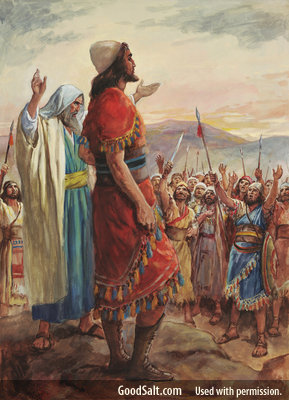 The entire career of Saul is in the context of Israel rejecting God and desiring to be like the world:
The entire career of Saul is in the context of Israel rejecting God and desiring to be like the world:
“Then all the elders of Israel gathered themselves together, and came to Samuel unto Ramah, And said unto him, Behold, thou art old, and thy sons walk not in thy ways: now make us a king to judge us like all the nations. But the thing displeased Samuel, when they said, Give us a king to judge us. And Samuel prayed unto the LORD. And the LORD said unto Samuel, Harken unto the voice of the people in all that they say unto thee: for they have not rejected thee, but they have rejected Me, that I should not reign over them.” (1 Samuel 8:4-7)
It is this process of idolatry that invokes the jealousy clause of Exodus 20:5.
“... for I the LORD thy God am a jealous God, visiting the iniquity of the fathers upon the children unto the third and fourth generation of them that hate Me.”
It makes certain that the Lord will oversee events to bring their own ways upon them. This then will satisfy their idea of justice and provide an opportunity for repentance and mercy to be received. Let’s see how this clause works as we continue.
After the disaster at Gilgal, when Saul assumed the work of the priest and offered a sacrifice as means of boosting the morale of the people in the face of war (1 Samuel 13:4-9), things went downhill very fast for Saul. Samuel rebukes the self-willed king by first asking, “What hast thou done?” (Verse 11a). Saul endeavored to excuse his own course, by depicting the terror of the people and the danger of an immediate attack from the Philistines (verses 11b, 12). But the prophet returned the stern and solemn answer:
“Thou hast done foolishly: thou hast not kept the commandment of the LORD thy God, which He commanded thee: for now would the LORD have established thy kingdom upon Israel forever. But now thy kingdom shall not continue: the LORD hath sought Him a man after His own heart, and the LORD hath commanded him to be captain over His people, because thou has not kept that which the LORD commanded thee.” (1 Samuel 13:13, 14)
Saul still refuses to repent and continues to justify himself. The Holy Spirit had been granted to Saul to enlighten his understanding and soften his heart. Saul did not love and fear God. He had never learned to trust and obey Him. Thus he did not have a correct appreciation of His character. The Lord did seek to enlighten Saul and draw him into the truth but sadly he remained self-willed and determined to the very end.1
Shortly after this, God blesses Jonathan to open the way for a great victory from Israel:
“Now it came to pass upon a day, that Jonathan the son of Saul said unto the young man that bare his armour, Come, and let us go over to the Philistines' garrison, that is on the other side. But he told not his father.” (1 Samuel 14:1)
“And Jonathan climbed up upon his hands and upon his feet, and his armourbearer after him: and they fell before Jonathan; and his armourbearer slew after him. And that first slaughter, which Jonathan and his armourbearer made, was about twenty men, within as it were an half acre of land, which a yoke of oxen might plow. And there was trembling in the host, in the field, and among all the people: the garrison, and the spoilers, they also trembled, and the earth quaked: so it was a very great trembling. And the watchmen of Saul in Gibeah of Benjamin looked; and, behold, the multitude melted away, and they went on beating down one another.” (1 Samuel 14:13-16)
God and His angels protected Jonathan and his attendant, but neither God nor His angels did any of the killing. This is how the New Living Translation sites verse 15:
“Suddenly, panic broke out in the Philistine army, both in the camp and in the field, including even the outposts and raiding parties. And just then an earthquake struck, and everyone was terrified.”
If you remember the story of Elijah, God revealed to Elijah that He is not in the earthquake (1 Kings 19:11, 12). Like Elijah, whose own character was revealed by the violent earthquake, the earthquake was a manifestation of the Philistine’s “panic” or as the KJV says, “trembling in the host … and among all the people.” The jealousy clause of the Lord overseeing events to bring their own ways upon them was at work – the violence that they intended for others came down upon their own heads:
“See the one who is pregnant with wickedness, who conceives destructive plans, and gives birth to harmful lies – he digs a pit and then falls into the hole he has made. He becomes the victim of his own destructive plans and the violence he intended for others falls on his own head.” (Psalm 7:14-16, New English Bible)
This is much like what happened in the time of Sodom and Gomorrah whose inhabitants “burned in their lust” and thus “received the inherent penalty for their error” by means of the cities being burned with fire and brimstone (Romans 1:27). Their own selfish actions caused a chain of events that brought destruction upon themselves. (See the article entitled: Did God Send Angels to Kill the Inhabitants of Sodom and Gomorrah?)
The angels watched over Jonathan and his armourbearer because their souls were imperiled. Now that Saul knows that his kingdom is under threat because Samuel has said it would be given to another, he is most alarmed that victory is occurring in Israel without his knowing anything about it! Saul is now very jealous for his own honor.
“And the men of Israel were distressed that day: for Saul had adjured the people, saying, Cursed be the man that eateth any food until evening, that I may be avenged on mine enemies. So none of the people tasted any food. And all they of the land came to a wood; and there was honey upon the ground. And when the people were come into the wood, behold, the honey dropped; but no man put his hand to his mouth: for the people feared the oath.” (1 Samuel 14:24-26)
Jonathan had not heard the oath and so took some honey to refresh himself (verses 27, 28). After this when Saul asked the Lord if they should continue the fight against the Philistines, he received no answer (verse 37). He now searched to see where the sin was in the camp. Within the justice system in which Saul is operating in, the Lord allows the lot to fall on Jonathan.
“And Saul said, Cast lots between me and Jonathan my son. And Jonathan was taken. Then Saul said to Jonathan, Tell me what thou hast done. And Jonathan told him, and said, I did but taste a little honey with the end of the rod that was in mine hand, and, lo, I must die. And Saul answered, God do so and more also: for thou shalt surely die, Jonathan.” (1 Samuel 14:42-44)
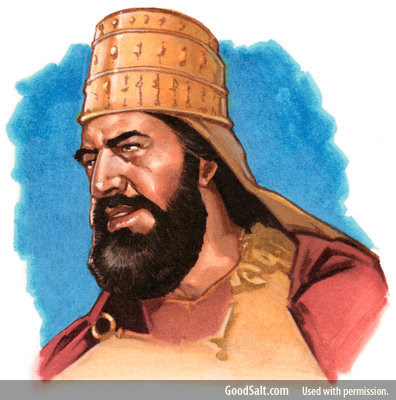 Like Adam who blamed his wife (Genesis 3:12), Saul was willing to offer one of his own flesh and blood in order to bring an atonement for the sin problem in the camp. Rather than accept responsibility and repent, he would rather offer up his own son as a sacrifice. The visitation of iniquity for Israel’s desiring a king really began to manifest itself. Saul’s insecurity in his position as king meant that any person that should advance the kingdom and cause the people to rejoice would be seen as a threat.
Like Adam who blamed his wife (Genesis 3:12), Saul was willing to offer one of his own flesh and blood in order to bring an atonement for the sin problem in the camp. Rather than accept responsibility and repent, he would rather offer up his own son as a sacrifice. The visitation of iniquity for Israel’s desiring a king really began to manifest itself. Saul’s insecurity in his position as king meant that any person that should advance the kingdom and cause the people to rejoice would be seen as a threat.
Had not the men of Israel interposed to save the life of Jonathan, their deliverer would have perished by the king's decree (verse 45). How bitter the thought that he had been placed upon the throne by their own act! A man willing to sacrifice his own son for the sake of his own injured pride must be seen to be a man under the control of Satan. This again is in perfect accord with God’s promise to visit the iniquities of the people upon the people by overseeing events so that “evil shall slay the wicked” (Proverbs 34:21). Saul began to sense his own curses falling upon his own head.
Now that Saul knows the kingdom is to be taken from him, and his own son seems to be more favored than he, himself, and the people resisted his authority in seeking to kill Jonathan, Saul seeks to regain his reputation by going to war with the neighboring tribes.
“So Saul took the kingdom over Israel, and fought against all his enemies on every side, against Moab, and against the children of Ammon, and against Edom, and against the kings of Zobah, and against the Philistines: and whithersoever he turned himself, he vexed them. And he gathered an host, and smote the Amalekites, and delivered Israel out of the hands of them that spoiled them.” (1 Samuel 14:47, 48)
Clearly this is not a man who is filled with the Spirit of Christ who said:
“But I (Jesus) say unto you which hear, Love your enemies, do good to them which hate you, Bless them that curse you, and pray for them which despitefully use you. And unto him that smiteth thee on the one cheek offer also the other … But love ye your enemies, and do good, and lend, hoping for nothing again; and your reward shall be great, and ye shall be the children of the Highest: for He is kind unto the unthankful and to the evil. Be ye therefore merciful, as your Father also is merciful.” (Luke 6:27, 28, 35, 36)
The sin of Saul’s self-interest and jealousy for his crown will now be visited upon the neighboring nations as punishment for their idolatry and rebellion. This again is in strict accord with Exodus 20:5 of visiting the iniquities of the fathers upon the children of them that hate Me (God).
Now we note with interest that Saul had already begun to wage war on the Amalekites – “he gathered an host, and smote the Amalekites.” This is before the command is given by God in 1 Samuel 15:1-3. Notice how the Young’s literal translation renders the command of God to Saul:
“ ‘Thus said Jehovah of Hosts, I have looked after that which Amalek did to Israel, that which he laid for him in the way in his going up out of Egypt. Now, go, and thou hast smitten Amalek, and devoted all that it hath, and thou hast no pity on it, and hast put to death from man unto woman, from infant unto suckling, from ox unto sheep, from camel unto ass.’” (1 Samuel 15:2-3)
The text is rendered as Saul has already taken these actions. The events of 1 Samuel 14:48 reveal that Saul had already intended to destroy the Amalekites. This ambition already existed within him without any “pity on it.” In the Command to brutally kill women and children the Lord was showing Saul what was already inside of him. He knew how Saul would understand these words even though they were not a declaration of favor, and it did not fix the destiny of the future. It was indeed an expression of God’s purpose towards Saul in view of Saul’s own character and conduct.
“Therefore speak unto them, and say unto them, Thus saith the Lord GOD; Every man of the house of Israel that setteth up his idols in his heart, and putteth the stumblingblock of his iniquity before his face, and cometh to the prophet; I the LORD will answer him that cometh according to the multitude of his idols; That I may take the house of Israel in their own heart, because they are all estranged from Me through their idols. Therefore say unto the house of Israel, Thus saith the Lord GOD; Repent, and turn yourselves from your idols; and turn away your faces from all your abominations.” (Ezekiel 14:4-6)
Here we see that, when we are becoming so hardened in our sins, God will answer and command things according to our evil desires. He does this in order for our sin to abound and we see its ugliness and disastrous results and in repentance seek God for cleansing, healing and restoration.
Just as the Lord never intended Abraham to sacrifice His own son but to consecrate him, so it was not the Lord’s desire or character to slay women and children. Both Saul and the Amalekites had refused to submit to Him and chose Satan as their guide. In sorrow God hid His face as the children’s heads were dashed to pieces against the wall. Saul’s desperation to hold onto his crown drove him to these extreme actions of killing children. Yet these actions were only the deeds of the Amalekites coming back upon them for they had done the same things to others in their history.
“Remember What Amalek Did to You”
Another clue to show that these actions are related to the visitation of sin with sin is found in 1 Samuel 15:2:
“Thus saith the LORD of hosts, I remember [פְקַד paqad] that which Amalek did to Israel, how he laid wait for him in the way, when he came up from Egypt.” (1 Samuel 15:2)
The word remember is the same word as found in Exodus 20:5 for visit. So the Lord is visiting or remembering that which Amalek did. What does the second commandment tell us is the process for visitation?
“… visiting [פְקַד paqad] the iniquity of the fathers upon the children unto the third and fourth generation of them that hate Me.” (Exodus 20:5)
Thus we have a direct connection showing us that God is punishing sin with sin. He is allowing the inherent consequences of sin to bring punishment on them. Saul had already determined to do this himself. In this determination the Lord would test Saul to see if he would fully obey when the Lord added His command to what Saul had purposed.
Throughout Jewish history and tradition the instruction to “Remember what Amalek did to you” has been number 603 of 613 laws that Jews adhere to from the Torah (the first five books of the Bible):
“Remember what Amalek did to you along the way when you came out from Egypt, how he met you along the way and attacked among you all the stragglers at your rear when you were faint and weary; and he did not fear God. Therefore it shall come about when the LORD your God has given you rest from all your surrounding enemies, in the land which the LORD your God gives you as an inheritance to possess, you shall blot out the memory of Amalek from under heaven; you must not forget.” (Deuteronomy 25:17-19, New American Standard Bible)
Giving their preconceived interpretation upon this Command, Rabbi Moshe ben Maimon (1135-1204) wrote the following:
“It is a positive command to constantly remember their evil deeds and ambush, to arouse hatred for them, as the verse states, ‘Remember what Amalek did to you’ (v.17). According to Oral Tradition we are taught: ‘Remember’—with your mouths; ‘Do not forget’ (v. 19)—in your hearts,’ for it is forbidden to forget the hatred we have for them.” (Laws of Kings 5:5)
Is this really why God gave this Command? The people who do not believe Jesus was the long-awaited Messiah miss out completely on His words from the Father:
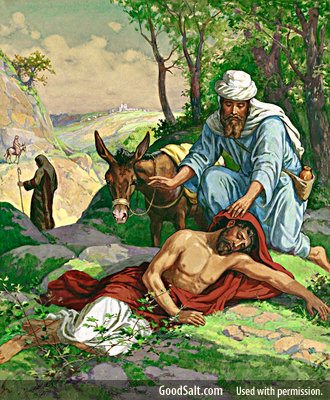 “Ye have heard that it hath been said, Thou shalt love thy neighbour, and hate thine enemy. But I say unto you, Love your enemies, bless them that curse you, do good to them that hate you, and pray for them which despitefully use you, and persecute you; That ye may be the children of your Father which is in heaven: for He maketh His sun to rise on the evil and on the good, and sendeth rain on the just and on the unjust.” (Matthew 5:43-45)
“Ye have heard that it hath been said, Thou shalt love thy neighbour, and hate thine enemy. But I say unto you, Love your enemies, bless them that curse you, do good to them that hate you, and pray for them which despitefully use you, and persecute you; That ye may be the children of your Father which is in heaven: for He maketh His sun to rise on the evil and on the good, and sendeth rain on the just and on the unjust.” (Matthew 5:43-45)
When Matthew quotes Jesus as saying, “for He (the Father) maketh His sun to rise on the evil and on the good, and sendeth rain on the just and on the unjust”, it is the same as we read from Luke earlier when He wrote, “He (the Father) is kind unto the unthankful and to the evil.”
Wouldn’t it make more sense that the instruction to “remember what Amalek did to you” was not to maintain hatred and prejudice towards them, but for our own struggle against unethical and devious behavior? In other words, remember how evil the Amalekites acted against you so that you do not follow the same course and treat others in the same manner. Paul teaches this same principle:
“Now these things happened to them as an example and warning [to us]; they were written for our instruction [to admonish and equip us], upon whom the ends of the ages have come. Therefore let the one who thinks he stands firm [immune to temptation, being overconfident and self-righteous], take care that he does not fall [into sin and condemnation].” (1 Corinthians 10:11, 12, Amplified Bible, words in brackets in original)
In Matthew 22 we read:
“Then one of them, which was a lawyer, asked Him (Jesus) a question, tempting Him, and saying, Master, which is the great Commandment in the Law? Jesus said unto him, Thou shalt love the Lord thy God with all thy heart, and with all thy soul, and with all thy mind (Deuteronomy 6:5). This is the first and great Commandment. And the second is like unto it, Thou shalt love thy neighbour as thyself (Leviticus 19:18). On these two Commandments hang all the Law and the Prophets.” (Matthew 22:35-40)
Here Jesus confirms that the whole “Old Testament” Scriptures (the Law and the Prophets) hang on these two Commandments to love God with all our heart, soul, and mind; and to love our neighbor as ourselves. Matthew quotes Jesus saying, “Therefore, however you want people to treat you, so treat them, for this is the Law and the Prophets.” (Matthew 7:12, New American Standard Bible). This eternal design protocol can be seen written in the Proverbs:
“Do not say, ‘I will repay evil’; wait for the LORD, and He will deliver you.” (Proverbs 20:22)
“Do not rejoice when your enemy falls, and let not your heart be glad when he stumbles … Do not say, ‘I will do to him as he has done to me; [nor say] I will pay the man back for what he has done.’” (Proverbs 24:17, 29)
“If your enemy is hungry, give him bread to eat, and if he is thirsty, give him water to drink.” (Proverbs 25:21)
Up till this point, Saul had always found a way to avoid fully doing what the Lord had commanded him to do. Knowing that Saul had purposed to take this action against the Amalekites, the Lord delivers him a message that gives to him the understanding that he has prophetic authority supporting him in what he was planning to do. As King Solomon said “bring me a sword … and divide the living child in half” in order that he may know what was in the hearts of the two women (1 Kings 3:24-27), so the Lord brings forth the sword against the Amalekites that He might know what is in Saul’s heart. Remember, through Ezekiel God said, “I the LORD will answer him that cometh according to the multitude of his idols; That I may take the house of Israel in their own heart.”
In Saul’s selfish and darkened mind, if he could somehow manage to complete a task – even of his own design, there was hope that Saul could come to the place of repentance in the future. It was Saul’s final test.
How God reaches down deep to save men. The Amalekites had filled up the cup of their iniquity and their doom was certain. Saul under the inspiration of Satan had determined to slaughter them in his raging insecurity and jealousy. If he could only take his actions with a sense of fulfilling a command from heaven, then there was a chance he could find repentance and live. Just imagine how Saul’s fate may have changed if he was truly filled with the Spirit of Christ and forgave his enemies. But since he wasn’t at that level of understanding due to the culture in which he lived, God loving reached down to meet him where he was.
Saul’s Confrontation with Samuel
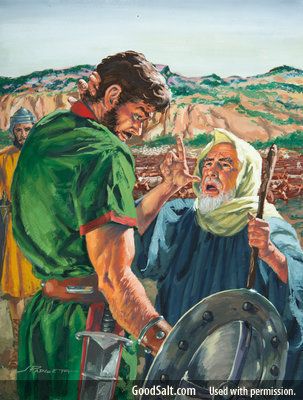 “And Samuel came to Saul: and Saul said unto him, Blessed be thou of the LORD: I have performed the Commandment of the LORD. And Samuel said, What meaneth then this bleating of the sheep in mine ears, and the lowing of the oxen which I hear?” (1 Samuel 15:13, 14)
“And Samuel came to Saul: and Saul said unto him, Blessed be thou of the LORD: I have performed the Commandment of the LORD. And Samuel said, What meaneth then this bleating of the sheep in mine ears, and the lowing of the oxen which I hear?” (1 Samuel 15:13, 14)
Saul seeks to justify his actions and blames the error on the people. The exchange intensifies:
“For rebellion is as the sin of witchcraft, and stubbornness is as iniquity and idolatry. Because thou hast rejected the word of the LORD, He hath also rejected thee from being king. And Saul said unto Samuel, I have sinned: for I have transgressed the Commandment of the LORD, and thy words: because I feared the people, and obeyed their voice. Now therefore, I pray thee, pardon my sin, and turn again with me, that I may worship the LORD. And Samuel said unto Saul, I will not return with thee: for thou hast rejected the word of the LORD, and the LORD hath rejected thee from being king over Israel.” (1 Samuel 15:23-26)
Samuel had intended to leave at this point but Saul begs him to stay and honor him. All he thinks about is his throne and protecting it. By divine direction Samuel yielded to the king's request, that no occasion might be given for a revolt. But he remained only as a silent witness of the service.
The Death of Agag
Now we come to the critical point of the death of Agag. All Israel knew that Saul had done the wrong thing and not obeyed the Lord completely. He did not spare their life out of mercy and love for his enemies, but because he was greedy and desired trophies to please his selfish pride. The people felt the guilt of taking some of the sheep and cattle. An act of justice, stern and terrible, was yet to be performed. Samuel must publicly vindicate the honor of God, and rebuke the course of Saul.
The human understanding of justice and atonement is death. God’s understanding of justice and atonement is mercy which draws people to at-one-ment (oneness) with God as we finally believe He is a loving Father who has never condemned us and has always been on our side. Jesus came to reveal His Father’s true character to those who misunderstood the portions of Scriptures that seemingly describe God as being a vengeful tyrant who needs to see blood for atonement. Jesus would take away our self-induced fear of ever being killed by our loving Father.
“Since therefore the children share in flesh and blood, He (Jesus) Himself likewise partook of the same things, that through death He might destroy the one who has the power of death, that is, the devil, and deliver all those who through fear of death were subject to lifelong slavery.” (Hebrews 2:14, 15, English Standard Version)
We note with great interest here, that the way Jesus would destroy the devil – “the one who has the power of death” – is not by killing him, but “through death” in dying on the cross. The cross revealed that Satan is the murderer (John 8:44) and the destroyer of mankind (1 Peter 5:8). The cross reveals the love of God and His Son who were willing to accommodate OUR own justice system so that we would finally believe in Their everlasting forgiveness toward us. This love would reconcile us to God’s never-changing love and “destroy the works of the devil” (1 John 3:8) that had taken root in our hearts and minds.
Satan is, and always has been, the accuser (Revelation 12:10). He is the one who has urged that every sin must be punished with death. He is the one who has introduced a false justice system. Satan sat on the judgment seat and instituted a theory of justice that demanded every sin must be punished without mercy. This suggestion meant that, when justice is executed, then mercy is cut off. This view of justice means that mercy cannot exist at all, because every sin must be punished. This false system was abhorrent to God:
“Next I saw Joshua the high priest standing before the Angel of the Lord, with Satan standing at his right hand to accuse him. The Lord said to Satan, “May the Lord rebuke you, Satan! May the Lord, who has chosen Jerusalem, rebuke you! Isn’t this man like a burning stick snatched from the fire?” Now Joshua was dressed in filthy clothes as he stood there before the Angel. The Angel spoke up to those standing all around, “Remove his filthy clothes.” Then He said to Joshua, “I have freely forgiven your iniquity and will dress you in fine clothing.” (Zechariah 3:1-4, New English Translation).
Whenever justice is poured out without mercy, it is an expression of Satan’s merciless justice system that he invented to smear the character of God and prevent anyone from returning to Him. Take a look at how Scripture defines how God executes true justice and judgment:
“Justice and judgment are the habitation of Thy throne: mercy and truth shall go before Thy face.” (Psalm 89:14)
In this verse we are taught that justice parallels mercy and judgment parallels truth. We see this parallelism again in Isaiah:
“Therefore the Lord will wait, that He may be gracious to you; And therefore He will be exalted, that He may have mercy on you. [why?] For the Lord is a God of justice; Blessed are all those who wait for Him.” (Isaiah 30:18, New King James Version)
And again in Zechariah:
“Then the word of the Lord came to Zechariah, saying, ‘Thus says the Lord of hosts: execute true justice, show mercy and compassion everyone to his brother. Do not oppress the widow or the fatherless, the alien or the poor. Let none of you plan evil in his heart against his brother.’” (Zechariah 7:9, 10, New King James Version)
Notice in the above verse how God’s “true justice” is executed:
- Show mercy and compassions every man to his brother.
- Oppress not the widow, nor the fatherless, the stranger, nor the poor.
- Let none of you imagine evil against his brother in your heart.
In the end, Satan and all his sympathizers will be judged by their own idea of justice. Everyone who receives justice without mercy will be receiving their own satanic judgment upon themselves; “for judgment is without mercy to the one who has shown no mercy.” (James 2:13). God tells us, “… as ye have spoken in mine ears, so will I do to you.” (Numbers 14:28). This doesn’t mean God is retaliating against us. No, it means God will allow the way we judge others to fall upon our own heads. If condemning and judging without mercy is what you believe a good system of justice is, then please remember, “He will render (give) to every man according to his deeds” (Romans 2:6). You will receive according to the way you have judged others and you will have no excuse nor complaint about it. He will accept your own verdict against yourself and will declare that this sentence is just.
Earlier we saw that we become “the victim of [our] own destructive plans and the violence [we] intended for others falls on [our] own head” (Psalm 7:16). The Psalmist describes this as God’s justice in verse 17: “I will thank the Lord for his justice; I will sing praises to the sovereign Lord!” He describes the same in chapter 9:
“The nations fell into the pit they had made; their feet were caught in the net they had hidden. The Lord revealed Himself; He accomplished justice; the wicked were ensnared by their own actions.” (Psalm 9:15, 16)
Again, God’s justice is not lashing out at His enemies to cause them any harm. God’s justice is giving man over to the destructive pit we dig for ourselves and permitting us to be ensnared by our own wicked actions. If we persistently resist His mercy and cut ourselves off from the only source of life, then only trouble and death await us. We must remember these eternal truths when discussing the death of Agag.
If Agag had remained alive then the guilt of not following orders would hang over Israel. Samuel was not planning to stay at this event, but he was directed by the Lord to remain there. How would God bring Israel back to a place where they could begin the path of repentance back toward God? They knew it was wrong for them to choose a king. Unless an atonement was made according to their sense of justice, they would have no hope of finding true repentance. It is not God’s justice that says, “without the shedding of blood there is no remission” (Hebrews 9:22); it is fallen mankind’s twisted and satanic sense of justice which believes this. God had to therefore allow their sense of justice to play out in order for them to be released from their sense of guilt and condemnation so they could begin the healing and restoration process. God met them where they were at their level of understanding.
Like Moses who had pled for the people who committed idolatry at the base of the mountain (Exodus 32:11-14), Samuel was alone with God, and he prayed all night with tears for Saul and Israel (1 Samuel 15:11). When Moses came down from the mountain and saw the idolatry of the people, he was spurred into action in zeal for God:
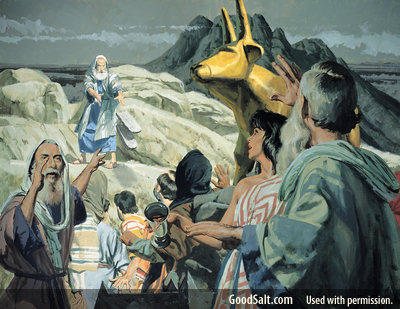 “And it came to pass, as soon as he came nigh unto the camp, that he saw the calf, and the dancing: and Moses' anger waxed hot, and he cast the tables out of his hands, and brake them beneath the mount. And he took the calf which they had made, and burnt it in the fire, and ground it to powder, and strawed it upon the water, and made the children of Israel drink of it … And when Moses saw that the people were naked; (for Aaron had made them naked unto their shame among their enemies:) Then Moses stood in the gate of the camp, and said, Who is on the LORD'S side? let him come unto me. And all the sons of Levi gathered themselves together unto him. And he said unto them, Thus saith the LORD God of Israel, Put every man his sword by his side, and go in and out from gate to gate throughout the camp, and slay every man his brother, and every man his companion, and every man his neighbour. And the children of Levi did according to the word of Moses: and there fell of the people that day about three thousand men.” (Exodus 32:19,20, 25-28)
“And it came to pass, as soon as he came nigh unto the camp, that he saw the calf, and the dancing: and Moses' anger waxed hot, and he cast the tables out of his hands, and brake them beneath the mount. And he took the calf which they had made, and burnt it in the fire, and ground it to powder, and strawed it upon the water, and made the children of Israel drink of it … And when Moses saw that the people were naked; (for Aaron had made them naked unto their shame among their enemies:) Then Moses stood in the gate of the camp, and said, Who is on the LORD'S side? let him come unto me. And all the sons of Levi gathered themselves together unto him. And he said unto them, Thus saith the LORD God of Israel, Put every man his sword by his side, and go in and out from gate to gate throughout the camp, and slay every man his brother, and every man his companion, and every man his neighbour. And the children of Levi did according to the word of Moses: and there fell of the people that day about three thousand men.” (Exodus 32:19,20, 25-28)
Like Moses, Samuel was surrounded by apostasy. All the work he had invested in the school of the prophets and teaching them the truth seemed in the balance. In order for the honor of God to be vindicated (in their own understanding), the command had to go forth to slay the rebellious. It was the only way for the people to have a sense that justice had been served as they perceived it.
Just as there is no direct command from God recorded for Moses and his fellow Levites to slay with the sword, there is no such command for Samuel to take the life of Agag. Yet Samuel knows that this man represents an affront to Jehovah and the complete downfall of Saul as King. Samuel has been up all night crying unto the Lord for Israel. Is it possible that the manner in which the rebellious ones at Mount Sinai and Agag were slain reflects those deep wounds that Israel had inflicted on Moses and Samuel that now finally surface in frustration?
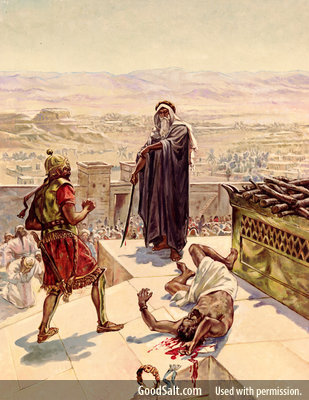 “And Samuel said, As thy sword hath made women childless, so shall thy mother be childless among women. And Samuel hewed Agag in pieces before the LORD in Gilgal.” (1 Samuel 15:33)
“And Samuel said, As thy sword hath made women childless, so shall thy mother be childless among women. And Samuel hewed Agag in pieces before the LORD in Gilgal.” (1 Samuel 15:33)
Saul wanted Samuel to honor him at his celebration of victory. Samuel destroyed the party atmosphere with pieces of Agag all over the party room floor. The death of the rebellious at Sinai and Agag provided the sense of justice that Israel could understand. It brought atonement in their minds even as Phinehas brought atonement in the slaying of Zimri and Cosbi:
“Phinehas, the son of Eleazar, the son of Aaron the priest, hath turned my wrath away from the children of Israel, while he was zealous for My sake among them, that I consumed not the children of Israel in my jealousy. Wherefore say, Behold, I give unto him My covenant of peace: And he shall have it, and his seed after him, even the covenant of an everlasting priesthood; because he was zealous for his God, and made an atonement for the children of Israel.” (Numbers 25:11-13)
We see here that Phinehas was zealous for God. This is the same root word as found in Exodus 20:5. Phinehas acted in his understanding of justice. Even though his understanding of justice was the counterfeit justice of Satan, it was the only possible way for the people to have a sense of justice and atonement. In this light, the rebellious at Sinai and Agag had to be sacrificed to man’s perceptions of justice. As Phinehas made atonement for Israel in the death of Zimri and Cosbi so Moses and Samuel made atonement for Israel in the death of the rebellious and Agag. This is atonement as humanity understands it so that we can see justice is served and then believe that God can accept us.
Samuel’s Wounds Revealed
How much easier would it be for Agag to simply die in his cell from a fear induced stroke or some disease? There were thousands of other ways for this man to die from natural causes due to lack of protection, but just as Jesus had to be preserved to face the death of the cross, so Agag had to be preserved to face execution by the sword. Justice had to be seen to be served by the people. Satisfaction had to be made that the door of mercy might then be seen as opened (which it had always been, but not perceived in their understanding). Like Moses, it was also necessary for Samuel to become aware of the seed that was sown in him when he was deeply wounded. Moses revealed his fallen anger towards the people again when he struck the rock twice instead of speaking to it, forfeiting his entrance into the promised land (Numbers 20:8-12).
This is a lesson for all of us to weigh carefully. Are there deep wounds we have received from others that we have not forgiven and asked the Lord to heal? They will surface again in the future. Let us pray now for hidden sins to be recognized and forsaken that we might not be used as a sinner to punish sin.
“How many are mine iniquities and sins? make me to know my transgression and my sin … That which I see not teach thou me: if I have done iniquity, I will do no more.” (Job 13:23; 34:32)
Another evidence that Samuel was acting in sin when he killed Agag is the fear of death that came upon him after he had killed:
“And the LORD said unto Samuel, How long wilt thou mourn for Saul, seeing I have rejected him from reigning over Israel? fill thine horn with oil, and go, I will send thee to Jesse the Bethlehemite: for I have provided Me a king among his sons. And Samuel said, How can I go? if Saul hear it, he will kill me …” (1 Samuel 16:1, 2)
This is exactly what happened to Elijah after he had killed the prophets of Baal:
Then Jezebel sent a messenger unto Elijah, saying, So let the gods do to me, and more also, if I make not thy life as the life of one of them by to morrow about this time. And when he saw that, he arose, and went for his life, and came to Beersheba, which belongeth to Judah, and left his servant there.” (1 Kings 19:2, 3)
Samuel had never shown any fear of Saul before he killed Agag. The fear of being killed only came after he had killed. If his act was a righteous act, he would not have this fear. The effects did not stop here. When Samuel went to Jesse’s home to anoint the next king, he did not perceive the right person:
“And it came to pass, when they were come, that he looked on Eliab, and said, Surely the LORD'S anointed is before him. But the LORD said unto Samuel, Look not on his countenance, or on the height of his stature; because I have refused him: for the LORD seeth not as man seeth; for man looketh on the outward appearance, but the LORD looketh on the heart.” (1 Samuel 16:6, 7)
There is a level of confusion in Samuel’s discernment of who the right person is. Something has blinded his perception because God said to him that man looks on the outward appearance and it was Samuel that had chosen Eliab looking through man’s eyes. It was not this way when Samuel was called to anoint Saul. God was able to communicate directly to him.
These two points indicate that Samuel was suffering from the effects of killing another person. The Lord instructed Samuel to stay at Saul’s celebration in order that Samuel could discover the woundedness that still remained in him. The Lord was revealing Samuel’s character to him while at the same time letting Agag receive the consequences of his choices and to allow Israel to have the belief that atonement and justice was served. How wise is our Father in heaven! How earnestly He seeks to reach the hearts of men and reveal to them the dross that remains in their souls.
 How wonderful to know our Father in heaven does not condemn us for our weaknesses and faults. He arranges events to bring out our characters to cause sin to abound:
How wonderful to know our Father in heaven does not condemn us for our weaknesses and faults. He arranges events to bring out our characters to cause sin to abound:
“Moreover the Law entered (our hearts/conscience), that the offence might abound. But where sin abounded, grace did much more abound.” (Romans 5:20)
Once Samuel had manifested his zeal, he then had time to reflect upon what he had done and pray about any remaining woundedness in his heart. Samuel was such a wonderful man of God who had served the Lord faithfully all his life. The Lord tested him to refine the remaining dross in his soul and prepare him for heaven.
1 See the article entitled: Why Did Men Such as King Saul and Samson Act Out in Violence When Filled With the Spirit of God?


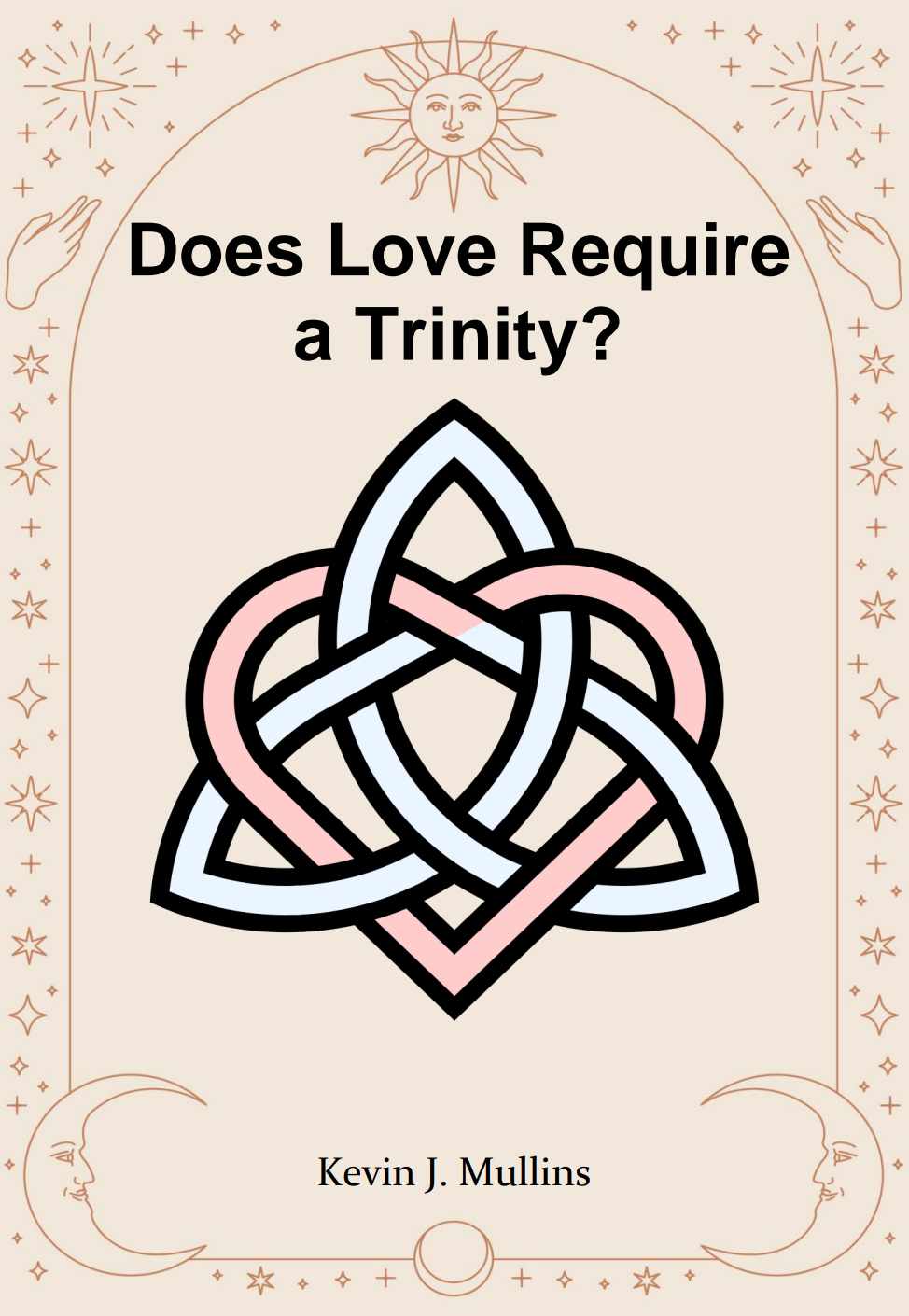

.jpg)

